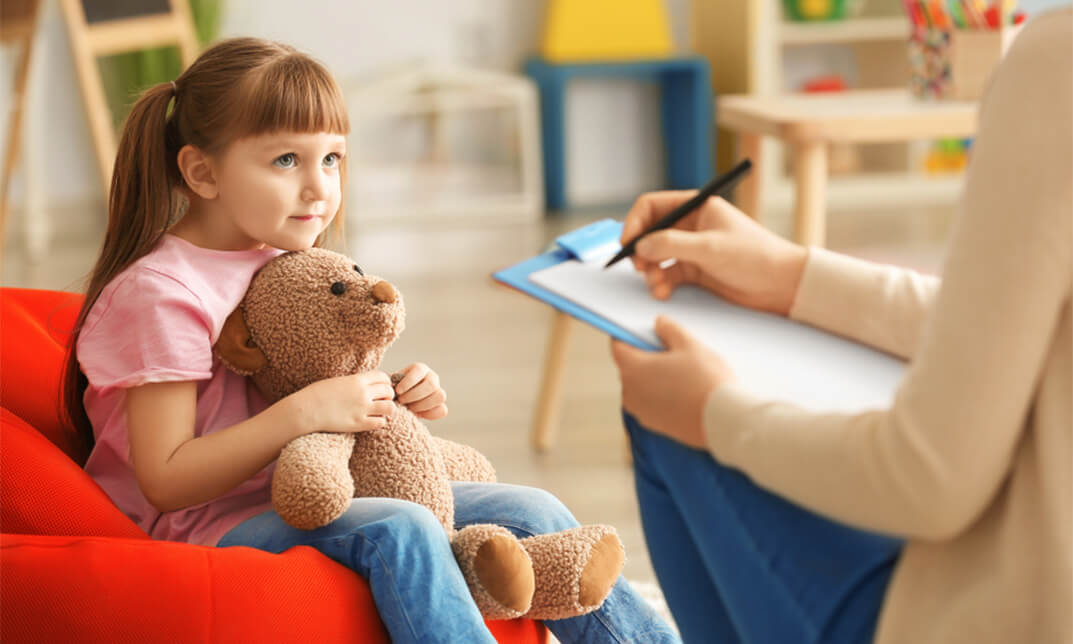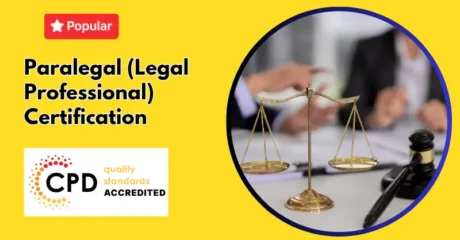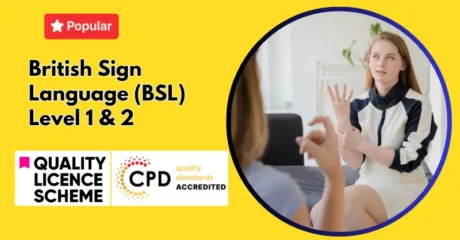 Children Counselling and Adolescents Diploma
Children Counselling and Adolescents Diploma
Counselling Children and Adolescents Diploma is designed to prepare learners for supporting young people through emotional, psychological, and developmental challenges. This programme explores topics such as growth and development, therapeutic language, psychological issues, therapeutic outcomes, and professional counselling approaches. Unlike general training, this course specifically focuses on the unique needs of children and teenagers, ensuring learners are equipped with tools to address their concerns effectively. As one of the most in-demand child counselling courses, it provides a structured pathway to meaningful careers. Moreover, this counselling children and adolescents diploma online is accessible and flexible, making it suitable for learners across the UK seeking accredited, specialised training.
 Course Description
Course Description
Every child deserves a safe space to express their thoughts and emotions, and this Counselling Children and Adolescents Diploma offers the knowledge required to provide such support. Through a carefully designed structure, it introduces psychological growth, explores developmental stages, and teaches how to use therapeutic language that resonates with younger minds.
In addition, learners will analyse psychological issues that impact children and adolescents today, from behavioural concerns to emotional struggles. Accredited training of this nature provides a strong foundation to deliver outcomes that nurture resilience and positive change. With modules covering therapeutic outcomes and professional counselling practice, learners will become confident in supporting wellbeing across diverse contexts.
Whether you are looking for accredited child counselling courses UK or flexible child counselling courses accredited, this diploma offers a pathway to new opportunities. Delivered as a counselling children and adolescents diploma online, it combines accessibility with quality, ensuring learners can study at their own pace while working toward professional goals.
Note: Skill-up is a Janets-approved resale partner for Quality Licence Scheme Endorsed courses.
 Learning outcome
Learning outcome
- - Analyse the stages of child and adolescent growth and development.
- - Apply therapeutic language strategies to support emotional communication.
- - Evaluate common psychological issues affecting children and teenagers.
- - Assess therapeutic outcomes and approaches to intervention.
- - Prepare for professional roles within accredited child counselling courses.
 Certificate of Achievement
Certificate of Achievement
Quality Licence Scheme Endorsed Certificate
Upon completing the final assessment, you can apply for the Quality Licence Scheme Endorsed Certificate of Achievement. Endorsed certificates can be ordered and delivered to your home by post for only £79.
Order Your QLS Certificate
An extra £10 postage charge will be required for students living overseas.
Skill Up Recognised Certificate
Upon successful completion of the Children Counselling and Adolescents Diploma course, you have the opportunity to request a Skill Up Recognised Certificate. This certificate holds significant value, and its validation will endure throughout your lifetime.
- 1. PDF Certificate + PDF Transcript: £14.99
- 2. Hardcopy Certificate + Hardcopy Transcript: £19.99
- 3. Delivery Charge: £10.00 (Applicable for International Students)
 Why should I take this Children Counselling and Adolescents Diploma course?
Why should I take this Children Counselling and Adolescents Diploma course?
- - Individuals pursuing careers in youth-focused counselling roles.
- - Those searching for child counselling courses accredited in the UK.
- - Professionals in education or childcare aiming to expand their skills.
- - Learners interested in completing a counselling children and adolescents diploma online.
- - Anyone looking for accredited child counselling courses UK to enhance career prospects.
 Job Opportunities
Job Opportunities
Children’s Counsellor
Average Salary: £30,000 – £40,000 per year
As a children’s counsellor, you’ll provide emotional support and guidance to children experiencing challenges such as bullying, anxiety, or family issues. You’ll work in schools, counselling centres, or private counselling settings, offering one-on-one or group sessions.
Children’s Bereavement Counsellor
Average Salary: £28,000 – £38,000 per year
Specialising in children’s bereavement counselling, you’ll help young individuals cope with the loss of loved ones. You’ll be using different therapeutic approaches tailored to their age and emotional understanding.
Health-Assured Counsellor
Average Salary: £32,000 – £42,000 per year
Working in health-assured counselling involves supporting patients referred through employee assistance programmes (EAPs). This involves addressing multiple issues, such as stress, mental health concerns, and work-life balance.
School Counsellor
Average Salary: £25,000 – £35,000 per year
School counsellors provide support to children and adolescents within educational settings. You’ll provide counselling for children to help them manage academic challenges, behavioural problems or personal issues.
Mind Charity Counsellor
Average Salary: £28,000 – £36,000 per year
Mind charity counselling involves working for organisations like Mind, where you’ll support individuals facing mental health challenges through one-on-one or group sessions. .
Private Counsellor
Average Salary: £40,000 – £60,000 per year (depending on client base)
In private counselling, you’ll run your own practice, offering tailored counselling support to your clients’ needs.
 Requirements
Requirements
- - No prior experience in Counselling Children and Adolescents Diploma is required.
- - Basic computer skills and internet access.
- - A willingness to learn and apply new concepts.
 Frequestly Asked Questions
Frequestly Asked Questions
The 3 3 3 rule for children is a simple grounding technique often used in counselling to help manage anxiety or overwhelming emotions. It encourages a child to name three things they can see, three things they can hear, and move three parts of their body. In therapeutic settings, this method is especially effective for younger clients who may struggle to verbalise their emotions. Within child counselling courses accredited in the UK, this approach is frequently highlighted as a useful intervention for calming children during stressful situations. Parents and teachers also use it to create emotional stability and support mindfulness in everyday environments.
Open-ended questions in counselling allow teenagers to explore their thoughts without feeling judged or restricted to “yes” or “no” responses. Examples include:
– “How do you usually feel when that happens?”
– “What do you think would make things better?”
– “Can you describe a time when you felt most supported?”
These questions encourage reflection, promote dialogue, and help counsellors identify underlying concerns. In the UK, professionals completing a counselling children and adolescents diploma online are trained to use open-ended communication as part of their therapeutic language. Such methods foster trust and openness, which are critical in youth mental health support.
Some of the most frequent counselling mistakes include:
– Talking more than listening.
– Using closed questions excessively.
– Offering personal opinions rather than professional guidance.
– Overlooking cultural differences.
– Failing to establish clear boundaries.
– Ignoring non-verbal cues.
– Giving advice too quickly.
– Underestimating the impact of trauma.
– Not recognising countertransference.
– Neglecting self-care as a counsellor.
In UK practice, accredited child counselling courses UK address these pitfalls to ensure professionals avoid habits that can damage the therapeutic process. By building strong reflective practice, counsellors create safer, more effective outcomes for children and adolescents.
Working with adolescents can present unique challenges such as resistance to therapy, difficulty building trust, peer pressure, identity struggles, and balancing confidentiality with safeguarding responsibilities. Counsellors must also address modern issues like social media influence, exam stress, and family conflict. UK-based child counselling courses accredited provide training to navigate these complex areas while maintaining professional standards. Counsellors who complete a counselling children and adolescents diploma online are prepared to manage these challenges with sensitivity and evidence-based techniques.
The four common adolescent concerns that significantly impact mental health include:
– Anxiety disorders – often linked to academic pressure and social challenges.
– Depression – related to self-esteem, relationships, and family stress.
– Behavioural issues – including risk-taking behaviours and defiance.
– Substance misuse – increasingly common as teenagers seek coping mechanisms.
In the UK, child counselling courses highlight these concerns to ensure counsellors can recognise signs early and provide appropriate interventions. Addressing these areas within counselling helps teenagers build resilience and reduces long-term mental health risks.
Countertransference occurs when a counsellor projects their own emotions, experiences, or unresolved issues onto a client. For example, a counsellor who struggled with similar adolescent issues may react more strongly or become overly protective during sessions. Recognising countertransference is essential for maintaining professional boundaries and ensuring objective support. Accredited training, such as the counselling children and adolescents diploma online, equips UK counsellors with strategies to manage these responses effectively. By doing so, they ensure therapy remains client-focused and ethical, safeguarding the wellbeing of children and adolescents.
Curriculum
-
About the Course & the Instructor
00:03:00
-
Definition of Counselling
00:04:00
-
The Counselling Relationship
00:06:00
-
The Development Cycle
00:07:00
-
Parent, Child, Teacher Relationships
00:08:00
-
The Complexities of Growth
00:08:00
-
Introduction – Psychological Development
00:09:00
-
Conflict and Stress
00:12:00
-
Behavioural Therapies
00:07:00
-
Working with Children
00:07:00
-
The Use of Language
00:07:00
-
Memory
00:08:00
-
Grief and Bereavement
00:06:00
-
Exploring Grief and Letting Go
00:07:00
-
Dysfunctional Families
00:08:00
-
What is Co-Dependency
00:07:00
-
Child Bullying and Child Abuse
00:08:00
-
Psychological Study of Education
00:07:00
-
Transformation
00:07:00
-
Using Newly Found Skills
00:05:00
-
Recovery – The Therapeutic Process
00:05:00
-
Moving on – Emotional Intimacy
00:06:00
-
Setting Up a Practice
00:10:00
-
Resources – Diploma in Counselling Children and Adolescents
-
Submit Your Assignment & Order QLS Certificate
-
Skill Up Recognised Certificate
-
Order CPDQS Certificate
-
Feedback
00:01:00
Offer Ends in

-
Duration:2 hours, 43 minutes
-
Access:1 Year
-
Units:28



.png) 128 Reviews
128 Reviews 137 Students
137 Students
 All
Courses for £49
All
Courses for £49


